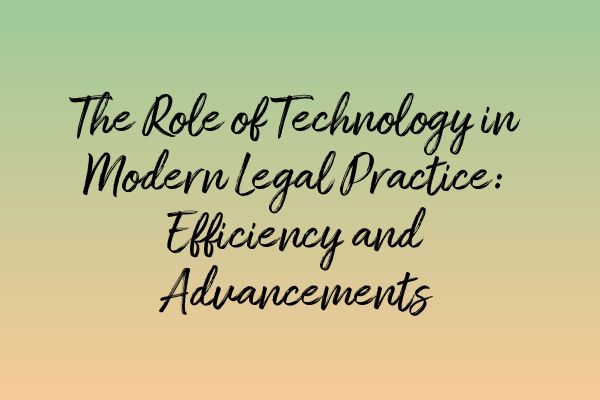Technology has revolutionized every aspect of our lives, including the legal profession. From research and document management to communication and courtroom presentations, technology has become an indispensable tool for modern legal practice. In this blog post, we will explore the role of technology in the efficiency and advancements of legal practice.
Efficiency in Legal Practice
One of the primary benefits of technology in legal practice is its ability to enhance efficiency. Gone are the days of flicking through numerous pages of books and files to find relevant legal precedents or statutes. With the advent of legal research databases and search engines, solicitors can now access a vast array of legal information with just a few clicks. This quick and efficient access to information enables solicitors to provide more accurate and well-informed advice to their clients.
Moreover, technology has revolutionized document management systems. Gone are the days of overflowing filing cabinets and mountains of paperwork. With electronic document management software, solicitors can now organize and store legal documents digitally. This not only saves physical space but also makes it easier to retrieve and share documents with colleagues and clients, leading to increased efficiency and productivity.
Another area where technology has played a significant role in improving efficiency is electronic communication. Email, instant messaging, and video conferencing have made communication between solicitors, clients, and other parties involved in a case much faster and more convenient. This eliminates the need for face-to-face meetings or lengthy phone calls, saving both time and resources.
Advancements in Legal Practice
Technology has also led to several advancements in legal practice. For example, courtroom presentations have been greatly enhanced with the introduction of multimedia tools. Solicitors can now present evidence, legal arguments, and case summaries using visual aids such as slideshows, videos, and interactive displays. This not only makes presentations more engaging and persuasive but also helps the audience, including judges and juries, to better understand complex legal concepts.
Furthermore, the rise of legal practice management software has revolutionized the way law firms operate. These software solutions streamline various administrative tasks, such as timekeeping, billing, and client management, allowing solicitors to focus more on practicing law. Additionally, these tools often come with built-in document automation features, enabling solicitors to generate legal documents more efficiently and accurately.
Keyword integration:
When it comes to technology in legal practice, efficiency and advancements are two crucial aspects. By leveraging the power of technology, solicitors can streamline their work processes, provide better services to their clients, and stay ahead in the competitive legal landscape. Whether it’s using legal research databases, electronic document management systems, or multimedia tools in the courtroom, technology has become an essential tool for solicitors to improve efficiency and achieve better outcomes for their clients.
If you’re interested in learning more about the different aspects of criminal law, you may find the following articles helpful:
- Private Prosecutions: Exploring Non-Governmental Prosecutions in Criminal Cases
- Ethical Challenges in Criminal Defence: Navigating Dilemmas
- Understanding Drug-related Offences: Laws and Penalties in the UK
- Magistrates’ Court vs Crown Court: Different Paths in Criminal Proceedings
- Criminal Defence Strategies: Expert Approaches to Protecting Clients’ Interests


Leave a Reply